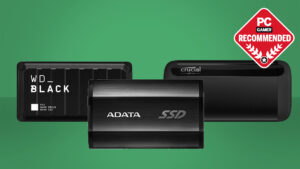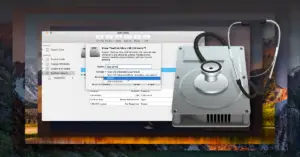Is External SSD Better Than HDD? Yes!
Yes, external SSDs are generally better than HDDs since they have faster read/write speeds, higher storage capacities, and are more reliable.
SSDs use flash memory to store information, which makes them faster and more efficient than HDDs.
HDDs, on the other hand, use spinning disks where data is written, making them slower. SSDs are also more durable because they have no moving parts, unlike HDDs.
External SSDs surpass HDDs in speed, reliability, and portability. SSDs, with their flash memory technology, offer lightning-fast data transfer speeds, making them ideal for various tasks such as file transfers, software execution, and gaming.
Unlike HDDs, SSDs have no moving parts, reducing the risk of mechanical failure and data loss. Their compact and lightweight design ensures easy portability, allowing users to carry their data wherever they go.
In the fast-evolving world of technology, external SSDs stand out as the superior choice for those seeking top-notch performance and data security.
7 Features Of External SSD Better Than External HDD
| Feature | External SSD | External HDD |
|---|---|---|
| Speed | Much faster, with data transfer rates ranging from 300 MB/s to 5,000 MB/s | Slower, with data transfer rates ranging from 40 MB/s to 200 MB/s |
| Durability | More durable as they have no moving parts, making them less prone to failure from physical damage | Less durable due to moving parts, prone to failure from physical damage |
| Portability | Generally lighter and more compact, easy to carry around | Heavier and bulkier, less convenient for portability |
| Power Consumption | Generally lower power consumption, leading to longer battery life for devices | Higher power consumption, may drain device battery faster |
| Noise | Virtually silent, as there are no moving parts | Can generate noise due to spinning disk and moving read/write head |
| Price | More expensive per GB of storage | Cheaper per GB of storage |
| Capacity | Available in smaller capacities (typically up to 4TB) | Available in larger capacities (up to 20TB and beyond) |
Key Takeaway

Five Facts About External SSD Better Than External HDD
Is External SSD More Reliable Than Hdd?
When it comes to storage reliability, external SSDs are generally considered more reliable than HDDs.
This is because SSDs lack any moving parts and so they don’t suffer from the same mechanical issues that can affect hard disk drives.
Additionally, SSDs often feature superior data protection features such as error correction code (ECC) memory, which helps prevent data corruption due to power fluctuations or other environmental factors.
Furthermore, compared to traditional spinning disks in HDDs, SSDs offer better heat dissipation since they generate less heat overall when in use.
All of these benefits make external SSDs a great choice for storing important files and ensure their safety over time.
Should I Buy an External SSD or HDD?
When deciding between an external SSD or HDD, it is important to consider factors such as the size of your data, your budget and performance needs.
An external SSD offers superior performance in terms of speed and responsiveness compared to an external HDD. However, they are more expensive than HDDs due to their use of Flash memory technology.
On the other hand, HDDs offer larger storage capacities at a lower cost but may be slower in terms of reading/writing speeds when compared to SSDs.
Ultimately, it comes down to what fits your needs best – if you need large amounts of space on a tight budget then an external HDD is probably the better choice for you; however, if you need faster speeds for video editing or gaming then an external SSD might be worth considering.
Is There Any Downside to an External SSD?
An external SSD does have a few downsides that should be taken into consideration when making the decision to invest in one.
Is External Ssd Faster Than Hdd?
Yes, external SSDs are significantly faster than HDDs. SSDs use flash memory and no moving parts, which enables them to access data more quickly than traditional spinning hard drives.
They provide faster boot times, quicker application loading times, faster file transfers, and improved system responsiveness overall compared to HDDs.
Additionally, an external SSD will be slightly slower than an internal one due to the additional steps involved in transferring data from the drive over a USB connection or other type of interface before it can be used by the computer.
SSD Vs HDD External Hard Drive Reliability
When it comes to reliability, SSD external hard drives are generally more reliable than HDD external hard drives.
SSDs have no moving parts which reduces the chance of mechanical failure and allows them to read and write data faster.
They are also less likely to suffer from physical damage or exposure to magnets or strong vibrations due to their lack of moving parts.
HDD external hard drives have spinning platters that can be affected by shock and vibration, making them more prone to mechanical failure than SSDs.
Best Ssd External Hard Drive
For those looking for the best external SSD hard drive, one option worth considering is the Samsung T5 Portable SSD. This lightweight, pocket-sized device offers speeds of up to 540 MB/s and has a capacity of up to 2TB.
Additionally, it features USB 3.1 Gen 2 compatibility with both Mac and PC systems, plus an AES 256-bit encryption that keeps your data secure from unwanted access.
The Samsung T5 is also backed by a three year limited warranty for added peace of mind.
Ssd Vs Hdd
SSD (Solid State Drive) and HDD (Hard Disk Drive) are two different types of storage devices used in computers.
SSDs offer faster read/write speeds, use less power, generate less heat, and are more reliable than HDDs.
However, they tend to be more expensive per gigabyte compared to HDDs which have larger capacities for the same price.
Ultimately it comes down to user preference as both can provide great performance depending on the situation.
Ssd Vs Hdd Pros And Cons
When considering which storage device to use, it is important to consider both the pros and cons of SSD vs HDD.
Solid State Drives (SSD) offer faster access times, increased durability, lower power consumption and better performance overall while Hard Disk Drives (HDD) provide more storage capacity for a lower cost.
However, HDDs are less reliable than SSDs due to their mechanical nature and can be affected by physical shock or vibration more easily.
Additionally, HDDs have slower read/write speeds compared to SSDs making them less ideal for tasks that require high levels of performance such as gaming or graphics processing.
The decision between an HDD or an SSD ultimately comes down to personal preference but keep in mind the trade-offs each has before making your choice.
FAQ On Is External SSD Better Than HDD
Is an External Ssd Better Than an Internal Hdd for Storage?
Yes, an external SSD is better than an internal HDD for storage.
An external SSD offers faster data transfer speeds, lower power consumption and higher reliability compared to an internal HDD.
Additionally, it does not produce as much noise or vibration as a traditional hard drive does.
How Much Faster is an External Ssd Compared to a Traditional Hdd?
An external SSD is typically up to 10 times faster than a traditional HDD.
Are There Any Downsides to Using an External Ssd Instead of a Hard Disk Drive?
Yes, there are some downsides to using an external SSD instead of a hard disk drive.
These include higher cost per gigabyte of storage compared to traditional HDDs, lower write speeds due to the use of flash memory rather than spinning disks, and limited capacity when compared with HDDs.
Additionally, external SSDs may be more fragile than traditional HDD drives, and require special care when being moved or transported.
What are the Benefits of Having a High-Performance External Ssd Over a Regular Hdd?
The benefits of having a high-performance external SSD over a regular HDD include faster read/write speeds, lighter weight, lower power consumption, and greater durability. Additionally, SSDs are more resistant to physical shock than HDDs and tend to last longer.
Conclusion
When choosing between an HDD and an SSD for storage purposes, it is important to consider your needs.
While both types of drives offer advantages in different areas, the external SSD will usually provide faster data access speeds and more reliable performance than the HDD due to its lack of moving parts.
For those who need a large amount of storage capacity or are planning on using their drive intensively over long periods, then an external SSD may be the better choice overall.






